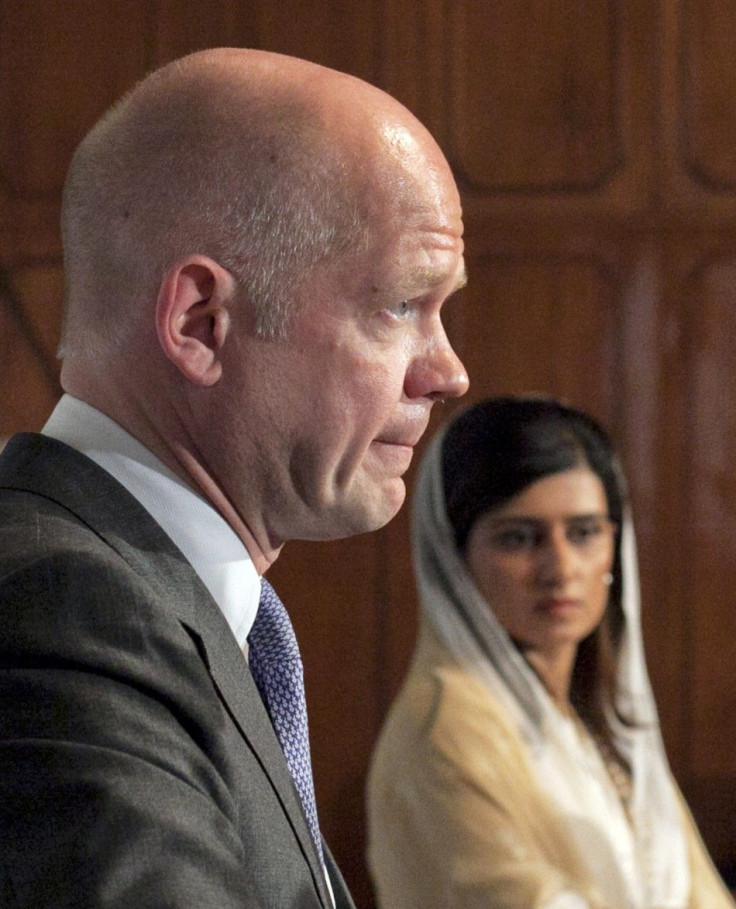Britain Caught Between US-Pakistan Rift

The British government is growing concerned over continued tensions between erstwhile allies, the United States and Pakistan, over NATO supply routes that Islamabad has refused to reopen since last November, when NATO missiles accidentally killed 24 Pakistani soldiers.
Visiting Islamabad, the British Foreign Secretary William Hague expressed his worry that the seven-month deadlock showed no signs of a resolution, following the cancellation on Monday of negotiations between Washington and Pakistani officials over the topic.
“We look to the United States and Pakistan to work successfully together, and of greater concern to us, even than those lines of communication, would be a rift between the United States and Pakistan,” Hague said.
“Obviously, we want this issue to be resolved, and of course we raised it and discussed it today.”
The British minister held discussions with both Prime Minister Yousuf Raza Gilani and Foreign Minister Hina Rabbani Khar and added that he urged a quick reconciliation.
It's important that the U.S. and Pakistan are able to work together, but I have not come here today to try to adjudicate or mediate on those things. As a firm ally of the U.S. and a deep friend of Pakistan, we hope the U.S. and Pakistan will be able to work successfully together in the future, Hague added.
Without the availability of overland transport routes from Pakistan, NATO forces have to use more expensive alternatives (including Central Asia) in order to get equipment and supplies to NATO soldiers and ground forces in Afghanistan.
However, Khar said the deadlock between her government and the U.S. was not serious.
“We are moving, we are interacting, we are consulting, we are engaged in dialogue with them [U.S.], she said.
We would hope that we can see, we can reach a solution that is acceptable to both the people and both the countries.”
Khar repeated her demand that the U.S. officially apologize for the November missile launch that killed those Pakistani soldiers. She also urged Washington to cease its unmanned drone strikes along the border between Pakistan and Afghanistan. While the U.S. asserts that such operations have killed a number of known militants in these northwestern tribal areas, Pakistan contends the drone strikes have killed too many innocent civilians and bystanders.
Maleeha Lodhi, Pakistan’s former ambassador to Washington, told Voice of America: The offer from the U.S. side is on the table, and from the Pakistan side, of course, its demand is also on the table, which is the United States must apologize. That is the key to unlocking the whole issue of the NATO supply routes.”
Last week, the American defense secretary, Leon Panetta, turned up the heat further on Pakistan by claiming that some elements of the Islamabad regime were harboring militants who were launching attacks on NATO troops across the border in Afghanistan.
On Monday, an unnamed U.S. official expressed his frustration with the Pakistanis in an interview with Reuters.
“If the civilian government in Islamabad would bite the bullet and make the political decision to open the ground lines of communication, that would deflect some of the negativity right now,” he said.
“It wouldn’t automatically turn things around, but that would be an important step. We have longer-term interests that we must keep in mind. The interests are nuclear, it is counter-terrorism, and it is also reconciliation in Afghanistan for a relatively peaceful and stable region.”
© Copyright IBTimes 2025. All rights reserved.





















